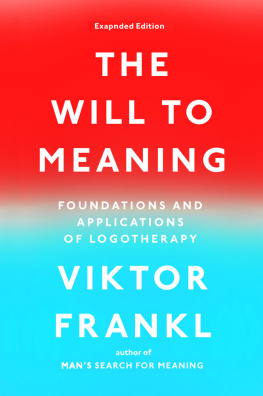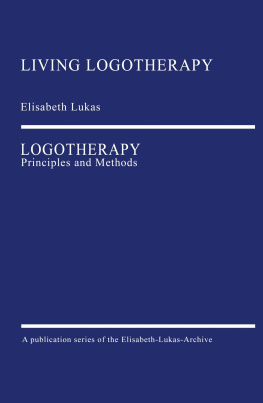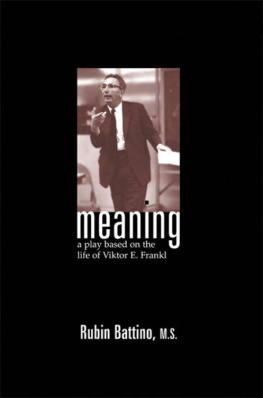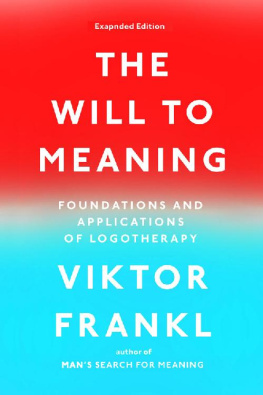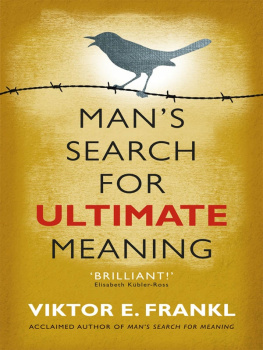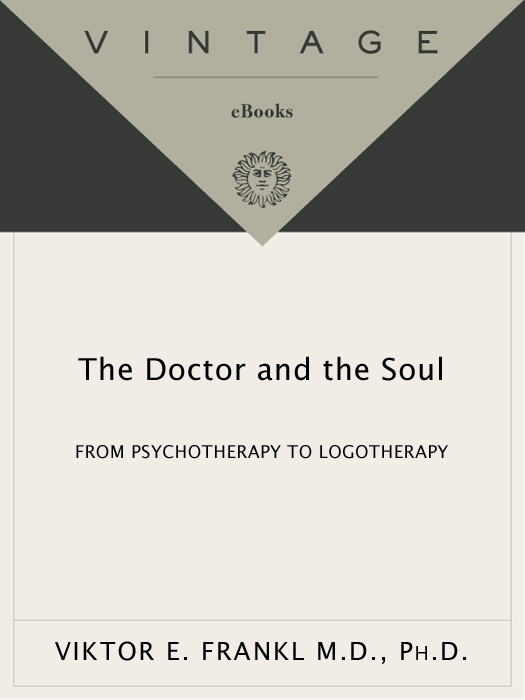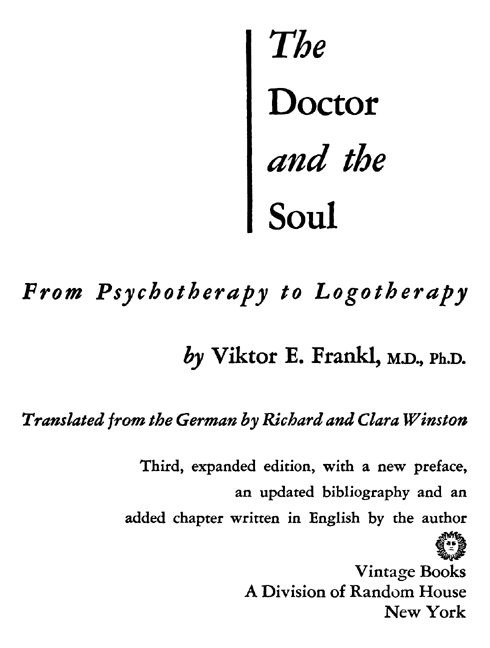Second Vintage Books Edition, October 1986
Copyright 1980, 1986 by Viktor E. Frankl
Copyright 1955, 1965 by Alfred A. Knopf, Inc.
Copyright renewed 1983 by Alfred A. Knopf, Inc.
All rights reserved under International and Pan-American Copyright Conventions. Published in the United States by Random House, Inc., New York, and simultaneously in Canada by Random House of Canada Limited, Toronto. Originally published in German as rztliche Seelsorge in 1946. Copyright 1952 by Franz Deuticke, Vienna. This translation originally published, in different form, by Alfred A. Knopf, Inc., in 1955 and 1965.
Psychotherapy on Its Way to Rehumanization was originally published in The International Forum of Logotherapy (Fall 1980 edition).
Library of Congress Cataloging in Publication Data
Frankl, Viktor Emil.
The doctor and the soul.
Translation of rztliche Seelsorge.
Bibliography: p.
1. Logotherapy. 2. Psychoanalysis. 3. Existentialism. I. Title. [DNLM:
1. Psychotherapy, WM 420 F831a]
RC489.L6F675413 1986 616.8914 85-40681
eISBN: 978-0-307-77291-6
v3.1
To the Memory of Tilly
Preface to the Third Edition
This newrevised and enlargededition of The Doctor and the Soul is the fifty-seventh that has been published in nine languages (in addition to the German original and the English edition, there are Spanish, Italian, Japanese, Finnish, Dutch, Danish, and Portuguese versions). Let me, therefore, say a few words regarding the story behind the booka story that has often been obscured by the misconceptions of the mass media whose representatives never weary of proclaiming that Viktor Frankl came out of Auschwitz with a brand-new psychotherapeutic system he had developed in the concentration camp. The very opposite is true: I entered the camp with a full-length book manuscript (hidden under the lining of my overcoat) which was indeed an outline of the basic concepts of logotherapy. I had worked on it up to the last moment and hoped to save it during my period of imprisonment. I could not anticipate that it would be taken away from me immediately and, of course, destroyed. Under the circumstances, I felt like a father who was not spared watching his children murdered before his eyes. The book was, in fact, my spiritual child who Id hoped would survive even if I did not do so myself.
To be sure, the concentration camps I went through did in fact serve as a testing ground that confirmed one of the main tenets of logotherapy, the theory that the basic meaning orientation of an individualor, as I am used to calling it, the will to meaninghas actual survival value. Under comparable circumstances, those inmates who were oriented toward the future, whether it was a task to complete in the future, or a beloved person to be reunited with, were most likely to survive the horrors of the camps (I say camps because the same lessons can be learned from the psychiatric literature on American soldiers kept in Japanese, North-Korean, and North-Vietnamese Prisoner of War camps).
Certainly this is true in my own casemy strong desire to rewrite my lost manuscript surely contributed to the chances of my survival. When, a few months before my liberation from my last concentration camp, I was suffering from typhus and, as a physician, knew that a vascular collapse during sleep was the principal danger, I tried hard to keep myself awake by scribbling shorthand notes on the back of small scraps of paper that a comrade had stolen for me, together with the stub of a pencil. Later these notes proved to be very helpful when I started reconstructing the manuscript.
Naturally, the new version was enriched by my personal experiences in the four camps where I was imprisoned for nearly three years. Just look at the chapter dealing with Psychology of the Concentration Camp. This chapter had really begun before I was given the scraps of paper and pencil: In another book of mine, Mans Search for Meaning, I describe its genesis:
Almost in tears from pain (I had terrible sores on my feet from wearing torn shoes), I limped a few kilometers with our long column of men from the camp to our work site. Very cold, bitter winds struck us. I kept thinking of the endless little problems of our miserable life. I became disgusted with a state of affairs which compelled me, daily and hourly, to think of only such trivial things. I forced my thoughts to turn to another subject. Suddenly I saw myself standing on the platform of a well-lit, warm and pleasant lecture room. In front of me sat an attentive audience on comfortable upholstered seats. I was giving a lecture on the psychology of the concentration camp! All that oppressed me at that moment became objective, seen and described from a remote viewpoint of science. By this method I succeeded somehow in rising above the situation, above the sufferings of the moment, and I observed them as if they were already of the past.
By the end of the same year in which all this happened, the manuscript of this bookincluding the new chapter On the Psychology of the Concentration Campwas completed. And I will never forget the sense of deep reward that I experienced when I went to my publisher in Vienna with the manuscript whose first version I had carried to Auschwitz. I felt like the man in the psalm:
he that goeth forth weeping, bearing precious seed, shall doubtless come again with rejoicing, bringing his sheaves with him.
The first printing of the book sold out within three days. But it still took nine years before an English translation was published, even though a commission appointed by the U.S. government to find European books that ought to be translated into English and issue them with its financial support selected The Doctor and the Soul as the only Austrian book published immediately after World War II worthy of this recommendation.
Frankly speaking, I do not like the title of the American edition. In English, terms such as soul and spirit are loaded with so many distinctly religious connotations (unlike the corresponding German words Seele and Geist) that, at least in the eyes of the scientifically minded psychiatrist and/or psychologist, the title more often than not works as a deterrentsuggesting inspirational reading based on a mixture of psychiatry and religion. The truth is that almost no one else has so sharply delineated the demarkation line between the two fields as I am often credited with having done. As an M.D., I have to see to it that logotherapy is applicable to each and every patient, including the irreligious, and that it is usable in the hands of each and every psychiatrist, including the agnostic. Nevertheless logotherapy sees in religion an important ingredient of human existence; religion, that is, in the widest possible sense of the word, namely, religion as an expression of mans search for ultimate meaning. Yet logotherapyby its very name a meaning-centered psychotherapyviews even mans orientation toward ultimate meaning as a human phenomenon rather than anything divine.
The fact remains that logotherapy is a supplement rather than a substitute for psychotherapy. And it is not intended to serve as a substitute for religion. By its very nature, it is concerned with what we logotherapists call nogenic neuroses, in the first place. However, according to the result of empirical research, the percentage of nogenic neuroses does not exceed twenty percent.


